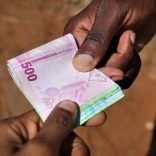Mozambique’s 2026 budget prioritises wage bill control and debt stabilisation – govt
Mozambique: Inflation likely to rise in 2025 due to violence, climate

FILE - For illustration purposes only. [File photo: Lusa]
Oxford Economics estimates that inflation in Mozambique is likely to rise from 3.1% this year to 5.4% in 2025, driven by climatic phenomena and the impacts of post-election violence.
“Inflation will likely face upward pressures in 2025 due to the adverse effects of the recent El Nino, constraints in supply and distribution chains due to disruptions following the elections, and an increase in capital expenditure,” reads the commentary issued by the British consultancy on the most recent inflation figures in Mozambique.
Prices in Mozambique rose 0.72% in November compared to October, with year-on-year inflation standing at 2.84%, higher than in October, according to data from the National Statistics Institute (INE).
This is the third consecutive monthly rise, after prices recorded four months of deflation: 0.11% in August, 0.05% in July, 0.21% in June and 0.38% in May.
Year-on-year inflation, which compares with the same month in 2023, recorded a rate of 2.84% in November, compared to 2.68% in October and 2.45% in September.
In early December, the central bank of Mozambique warned that prices were expected to continue to rise due to the consequences of post-election tension in the country.
The Economic Situation and Inflation Prospects (CEPI) report indicates that inflation in Mozambique “remained stable in October”, despite a slight increase to 2.68%, but “short-term prospects point to an acceleration in annual inflation in the fourth quarter of 2024”.
“This forecast is essentially due to restrictions on the supply of goods and services resulting from post-election tension,” the report reads.
The announcement by the National Electoral Commission (CNE) of Mozambique, on 24 October, of the results of the elections of 9 October, in which it attributed victory to Frelimo candidate Daniel Chapo, with 70.67% of the votes, sparked a call for popular protests by presidential candidate Venâncio Mondlane, which have degenerated into violent clashes with the police.
According to the CNE, Mondlane came in second place, with 20.32%, but he does not recognize the results, which still have to be validated and proclaimed by the Constitutional Council.
“Our projections have already incorporated these risks and uncertainties,” the governor of the Bank of Mozambique has said.
The wave of post-election protests in Mozambique since 21 October has severely impacted economic activities, with protests even spreading to Ressano Garcia, the country’s main border crossing with South Africa.












Leave a Reply
Be the First to Comment!
You must be logged in to post a comment.
You must be logged in to post a comment.